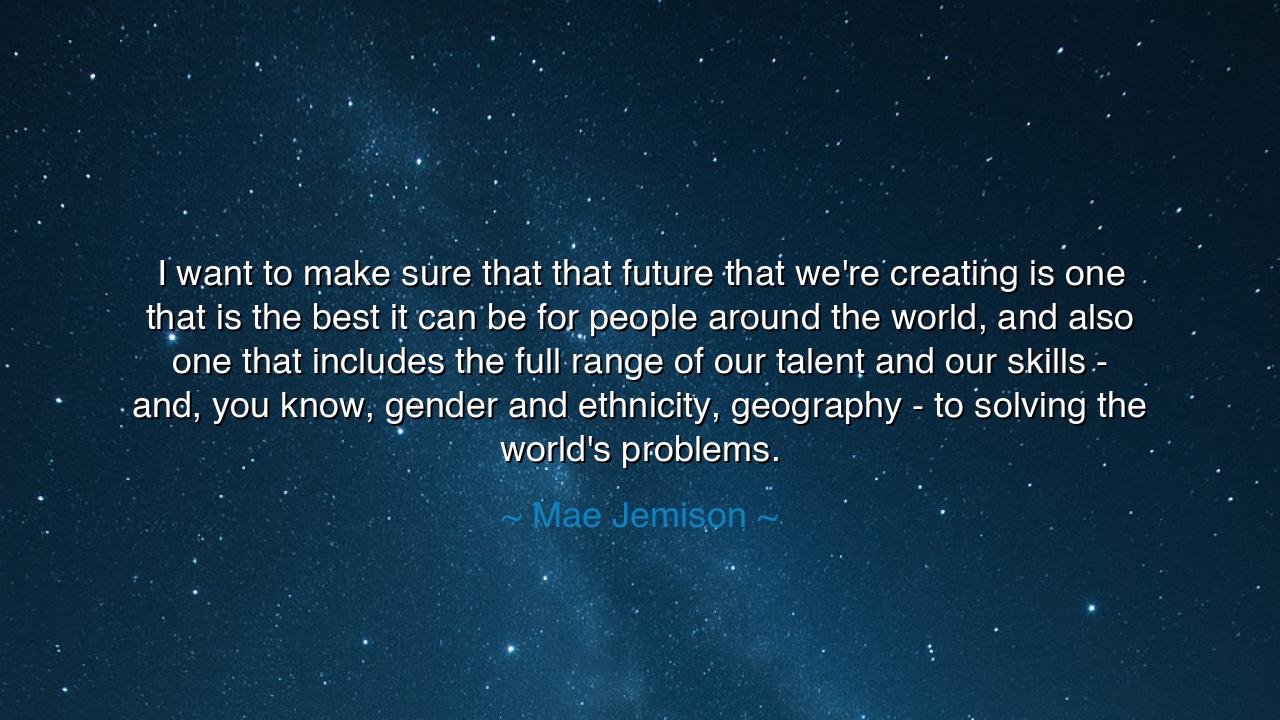
I want to make sure that that future that we're creating is one
I want to make sure that that future that we're creating is one that is the best it can be for people around the world, and also one that includes the full range of our talent and our skills - and, you know, gender and ethnicity, geography - to solving the world's problems.






In the powerful words of Mae Jemison, we hear a call to action that resonates with the urgency and hope needed to shape the future. Jemison, a trailblazer who broke barriers in the fields of science, space exploration, and humanitarian efforts, reflects on the necessity of ensuring that the future we create is one that is inclusive—a future that taps into the full potential of humanity. She speaks of a future that is optimistic, equitable, and driven by the diverse talents of people from all corners of the world. It is not enough, she suggests, to solve the world’s problems with a narrow perspective; we must call upon the full range of gender, ethnicity, and geography to find the best solutions.
This concept of inclusivity and the diverse contributions of individuals from all walks of life is not a modern invention. The ancients understood that the strength of any society lay in the unity and collaboration of its people. In ancient Greece, the city-state of Athens was at its zenith not because of the brilliance of any single individual, but because its citizens—though often divided by social class, wealth, and background—came together to create a society where art, philosophy, and democracy flourished. The works of Socrates, Plato, and Aristotle are proof that the brightest ideas often emerge from diverse minds, and these thinkers themselves were inspired by the collective wisdom of their society. Similarly, Jemison’s vision suggests that the best future will emerge not from a homogeneous group but from a mosaic of talents and perspectives.
In Rome, the idea of collaboration and the integration of different peoples was essential to the empire’s success. The Roman Empire spanned across continents, and within its vast borders, people from various cultures, languages, and traditions came together. The Romans recognized the value of this diversity, incorporating the knowledge and skills of the conquered peoples into their own systems. This cultural exchange was not a matter of mere survival; it was essential for the advancement of Roman society. Similarly, Jemison’s call for a future that includes all people—irrespective of their background—is a recognition that no one culture or group can solve the world’s problems on its own. Global collaboration is the key to lasting progress.
Consider the example of Marie Curie, the first woman to win a Nobel Prize and a pioneer in the field of radioactivity. Curie’s success is a testament to the power of breaking through barriers—both gender and ethnicity—to contribute to scientific knowledge. Born in Poland to a family of modest means, and faced with the gender biases of her time, Curie pushed through personal and societal obstacles to revolutionize science. Her work was not just her own, but a contribution to the global scientific community that transcended borders, gender, and ethnicity. Marie Curie’s life exemplifies the idea that talent and knowledge are not confined to any one group; when individuals from diverse backgrounds are given the opportunity to contribute, they can change the course of history. Jemison’s words echo this same spirit, asserting that the future must include the full range of human potential, not just a select few.
Jemison’s vision also evokes the ancient concept of universalism, the idea that all human beings, regardless of origin, are part of a greater whole. In Hindu philosophy, the notion of unity and interconnectedness is central to understanding the world. The Upanishads teach that all beings are part of the same divine essence, and it is only through recognizing this unity that we can find true peace and fulfillment. This ancient wisdom reflects Jemison’s belief that the solutions to global challenges will only be found when we recognize the interconnectedness of all people, regardless of their backgrounds. The challenges of our time—whether they be climate change, poverty, or inequality—require a unified approach that draws on the wisdom and talents of all nations and peoples.
The lesson in Mae Jemison’s words is one of inclusivity and global cooperation. The future we create must not be shaped by the narrow confines of a single culture or perspective, but by the diverse contributions of all. Just as Socrates and Aristotle shaped Western thought through their philosophical dialogue, we too must engage in a global dialogue, recognizing that each voice—whether male or female, from Africa, Asia, Europe, or the Americas—has something vital to contribute. Our collective future, one of peace, progress, and innovation, depends on our ability to embrace diversity and unity in equal measure.
In practical terms, we can apply this wisdom by actively seeking out opportunities to collaborate with people from different backgrounds and perspectives. Whether in our workplaces, communities, or international relations, it is essential to recognize that our strength lies not in uniformity but in diversity. We must create spaces where everyone’s voice is heard and their unique experiences are valued. Only by embracing the full spectrum of human talent—from different cultures, genders, and regions—can we hope to solve the complex problems that face us today and build the bright future that Jemison envisions. Through unity in diversity, we can harness the collective power of the global community to build a world that is not only successful but just for all.






AAdministratorAdministrator
Welcome, honored guests. Please leave a comment, we will respond soon